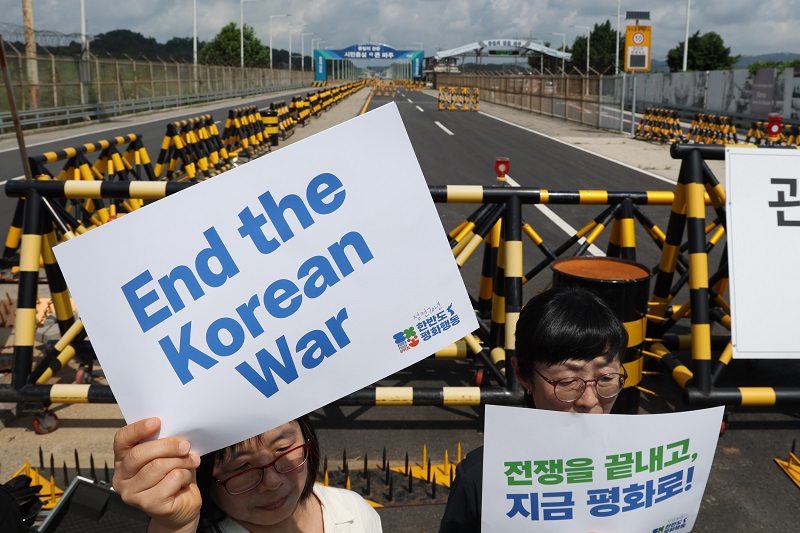
By David Kim
The author is a Los Angeles children’s court attorney currently running for the U.S. House of Representatives in California’s 34th Congressional District.
Last week, in Washington D.C., hundreds of peace-loving individuals from across the nation came together in a national call for peace in Korea. Their passionate plea must reach the ears of our government.
Over 70 years ago, a series of decisions made by American policymakers irreversibly changed the fate of the Korean people and their ancestral land 7,000 miles away, impacting millions of Korean families both on the peninsula and in the diaspora.
The first critical decision occurred in August 1945, following Japan’s defeat in World War II. Assigned to establish an American occupation zone in Korea, young American officers Dean Rusk and Charles Bonesteel hastily drew a line across the 38th parallel on a National Geographic map, dividing the peninsula into what is now South Korea including Seoul, below the line, under American forces, and North Korea including Pyongyang, above the line, under Soviet forces. Disturbingly, this decision was made without consulting any Koreans, disregarding their aspirations.
The second pivotal moment came in 1950 during the Korean civil war, when the U.S. intervened on behalf of South Korea in the name of countering communism. U.S. President Harry Truman sought international support from the United Nations Security Council without Congressional authorization, resulting in what was intended to be a limited “police action” escalating into one of the most brutal conflicts of the 20th century.
The Korean War saw over 600,000 tons of bombs dropped on North Korea, surpassing the total used in the entire Pacific theater during World War II. The devastating toll included four million lives lost, including 36,913 American soldiers. Entire Korean cities were leveled, leaving the peninsula soaked in blood. Millions of people became refugees, with two million children left orphaned and countless families torn apart.

While the world may have forgotten the war, the Korean people have not. Today, the Korean people and Korean Americans here have not forgotten the dream of a harmonious and peaceful Korea, free from perpetual conflict.
And while the Republic of Korea has cemented its role as an integral American ally, this friendship has not prioritized what seems obviously most important above all else – peace on the Korean Peninsula.
Peace cannot be conditional. Peace is the non-negotiable prerequisite for all advancements of humanity. To establish diplomatic relations, we must first aim for peace. To attain any efforts of denuclearization, we must first establish peace. To make real progress in uplifting human rights, we must first achieve peace.
Realizing peace on the Korean peninsula requires a diplomatic and political commitment that transcends the challenges of the past. The path to peace begins with recognizing that peace is an essential prerequisite for all advancements of humanity. Diplomatic relations, denuclearization efforts, and the promotion of human rights all hinge on achieving peace. It is time for the U.S. to acknowledge that the current state of hostility contradicts American democratic values and humanitarian ideals.
It is not impossible to overcome the seemingly insurmountable challenge. By fostering the political will to engage in difficult diplomacy, we can address the concerns raised by retired U.S. Air Force Lt. General Dan Leaf, who wisely cautioned that “No matter how challenging the negotiations and politics of securing peace on the Korean Peninsula may prove, they are nothing compared with nuclear war.”
President Biden and Congress hold the key to fulfilling their obligations to end the “Forgotten War” that they helped start and left unresolved over seven decades ago. Through sincere diplomacy and dialogue, we can establish lasting peace on the Korean Peninsula. This is a solemn duty to honor the Korean people who dream of reunification, prosperity, and a peaceful future.
Even this seemingly insurmountable challenge is possible if we garner the resolve and commitment to engage in dialogue and seek solutions. We know this is possible in our lifetime.




